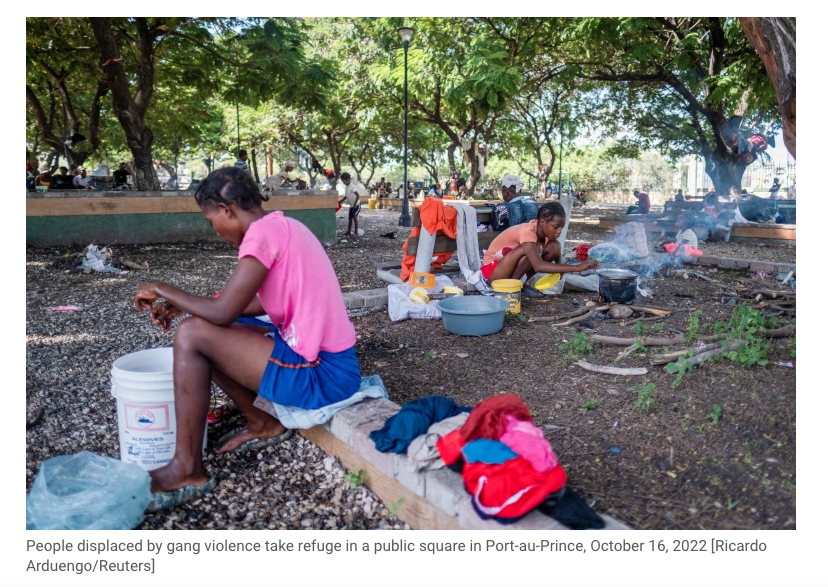UN Secretary-General Antonio Guterres says action needed to end gangs’ blockade of port, allow in fuel and aid.

Al Jazeera
The head of the United Nations has called for “armed action” in Haiti, warning that residents face a “nightmarish” situation, especially in the capital, Port-au-Prince.
UN Secretary-General Antonio Guterres said on Monday that he believed such action was necessary to ease the grip gangs have on a port that is critical to allowing fuel supplies into the country.
A weeks-long gang blockade of the Varreux terminal in Port-au-Prince has led to critical shortages of fuel and water and complicated efforts to respond to a dangerous outbreak of cholera.
“It’s an absolutely nightmarish situation for the population of Haiti, especially in Port-au-Prince,” Guterres said.
“I believe that we need not only to strengthen the [Haitian] police – strengthening it with training, with equipment, with a number of other measures – but that in the present circumstances, we need an armed action to release the port and to allow for a humanitarian corridor to be established,” he said.
Prime Minister Ariel Henry this month asked the international community to help set up a “specialised armed force” to quell the violence, which has worsened in the power vacuum created by the 2021 assassination of President Jovenel Moise.
But many Haitian protesters and civil society leaders have rejected the prospect of international intervention, saying history has demonstrated that foreign forces bring “more problems than solutions”.
UN peacekeepers were linked to a 2010 cholera outbreak that killed about 10,000 people, and years of international efforts to bolster Haitian democratic institutions and law enforcement capacity have largely failed.
The current crisis also has put a spotlight on questions around the legitimacy of Henry, who took up the prime minister’s post just weeks after Moise’s killing.
Haitians have protested over the last several weeks, with many calling on Henry to step down.
On Saturday, Canada and the United States announced the delivery of security equipment purchased by the Haitian government, including “tactical and armoured vehicles” to be used by the Haitian National Police (HNP).
“This equipment will assist the HNP in their fight against criminal actors who are fomenting violence and disrupting the flow of critically-needed humanitarian assistance, hindering efforts to halt the spread of cholera,” Global Affairs Canada, a federal ministry, said in a statement.
Henry welcomed the transfer, saying on Twitter that Haiti would continue to count on its partnership with both countries “with the aim of reinforcing the capacity of our police force”.
On October 9, Guterres had urged the international community “to consider as a matter of urgency” Haiti’s call for a specialised armed force. Last week, US President Joe Biden’s administration said it was reviewing the request.
US Secretary of State Antony Blinken also said on Wednesday that Washington would accelerate the delivery of humanitarian assistance to people in Haiti, nearly half of whom face an acute lack of food, according to the UN.
Blinken added that new visa restrictions were imposed against Haitian officials and others “involved in the operation of street gangs and other Haitian criminal organisations”. He did not specify which officials were targeted.
On Monday, US lawmakers also announced plans to introduce bipartisan legislation in the House of Representatives and the Senate to identify “relationships between criminal gangs and political and economic elites in Haiti” and impose sanctions on those individuals.
“This legislation targets these individuals who perpetuate unspeakable violence against the Haitian people, and the powerful public figures who deploy these gangs for their own benefit,” Democratic Senator Tim Kaine, one of the Senate resolution’s co-sponsors, said in a statement.
Meanwhile, the US’s ambassador to the UN said during a special Security Council (UNSC) meeting on Haiti on Monday afternoon that the US and Mexico were working to draft two UNSC resolutions in response to the crisis.
The first would impose financial sanctions on Haitian “criminal actors”, including powerful G9 gang leader Jimmy “Barbecue” Cherizier, to freeze the targeted individuals’ assets and prevent their access to weapons, Linda Thomas-Greenfield said.
“[Cherizier] is directly responsible for the devastating fuel shortage that is crippling the country,” the UN envoy said.
The second resolution, she added, would “authorise a non-UN, international security assistance mission to help improve the security situation and enable the flow of desperately needed humanitarian aid”.
“This resolution will propose a limited, carefully-scoped, non-UN mission led by a partner country,” said Thomas-Greenfield, adding that such a mission would rely on support from UN member states, who will be asked to provide personnel, equipment and other resources.
It is unclear when the resolutions will be finalised and put forward.